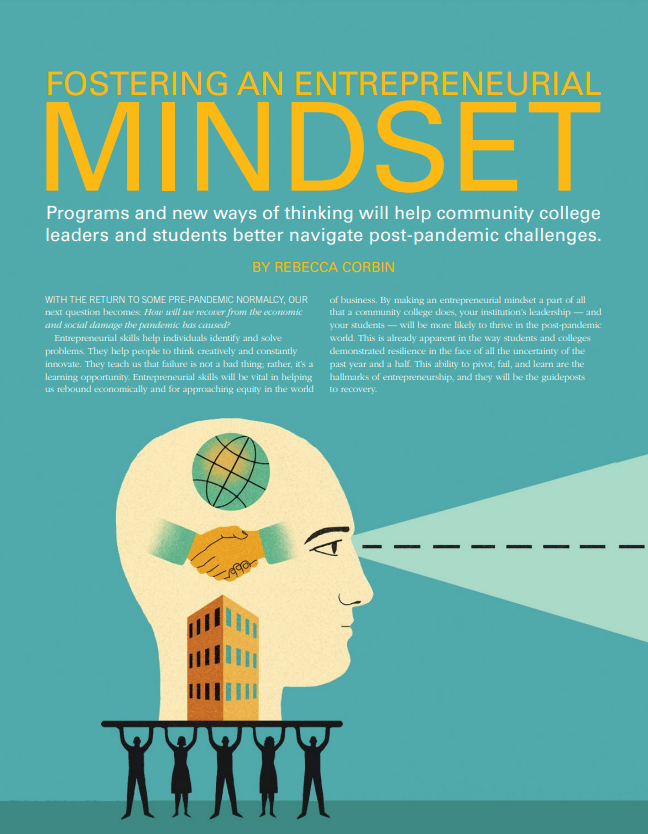Fostering An Entrepreneurial Mindset
This article was originally published in the Fall 2021 Trustee Quarterly.
 With the turn to some pre-pandemic normalcy, our next question becomes: How will we recover from the economic and social damage the pandemic has caused?
With the turn to some pre-pandemic normalcy, our next question becomes: How will we recover from the economic and social damage the pandemic has caused?
Entrepreneurial skills help individuals identify and solve problems. They help people to think creatively and constantly innovate. They teach us that failure is not a bad thing; rather, it’s a learning opportunity. Entrepreneurial skills will be vital in helping us rebound economically and for approaching equity in the world of business. By making an entrepreneurial mindset a part of all that a community college does, your institution’s leadership — and your students — will be more likely to thrive in the post-pandemic world. This is already apparent in the way students and colleges demonstrated resilience in the face of all the uncertainty of the past year and a half. This ability to pivot, fail, and learn are the hallmarks of entrepreneurship, and they will be the guideposts to recovery.
Encouraging Entrepreneurial Experiences
A growing number of students in community colleges across the country are participating in programs that encourage entrepreneurial thinking, such as “Pitch for the Trades,” sponsored by the Philip E. & Carole R. Ratcliffe Foundation in partnership with the National Association for Community College Entrepreneurship (NACCE).
Student teams compete for prize money to launch, scale, or support new skilled trade entrepreneurial projects. Some examples include:
- A group of students from City College of San Francisco won $32,000 for their Innovation and Incubator Hub that provides space for students to brainstorm new ideas and solutions for the trades.
- Washtenaw Community College in Michigan was awarded $23,000 for its HVAC Partnership Pipeline project that prepares graduates of its HVAC program for business ownership.
- Catawba Valley Community College in North Carolina benefited from a $25,000 award to launch a first-of-itskind collaboration between a local farm and the college. The initiatives span horticulture technology, hospitality and tourism, and beverage production, and include entrepreneurial practicums to introduce students to employment opportunities and business startup essentials.
Opportunities for Scaling
Similarly, the Everyday Entrepreneur Venture Fund (EEVF) enables community college students studying entrepreneurship to explore how to build sustainable funds to support local startups and scale-ups that might otherwise lack access to traditional funding. This program builds on the work of Chip and Stuart Weismiller, who invested $1 million in 2019 towards the program’s proof of concept in four community colleges before joining forces with NACCE to pilot the program for scale and expansion.
The second phase of the EEVF program, announced in mid-2020, includes five additional community colleges. To date, more than 50 businesses have been established through the EEVF program with $600,000 expended through student grants or loans. In 2021, NACCE will add more than 30 new colleges to the EEVF program, leading to the launch of more than 100 new businesses by year end.
Colleges Flexing Their Entrepreneurial Mindset
In addition to helping students build entrepreneurship skills, colleges themselves have benefited from these skills. Hard-hit by the economic effects of the pandemic, many community and technical colleges demonstrated the power of entrepreneurial thinking through their resiliency and ability to pivot in astounding ways to survive and even flourish. For instance:
- In 2020, Dabney S. Lancaster Community College (DLCC) President John Rainone and his team raised approximately $1 million to acquire and develop the college’s new workforce and entrepreneurship center that will open in 2022. Through the new center, entrepreneurially minded students can take advantage of expanded workforce development offerings through partnerships with local employers in manufacturing, apprenticeships, unmanned systems technology, and the arts.
- When most colleges were pulling back on new offerings, San Diego College of Continuing Education (SDCCE) launched the ICOM Academy (Interactive Competency based Online Microcredentialing) last fall. The new, fully online educational program provides adult learners with fast, free, flexible job training and extensive career placement services. Certificate programs are offered online, and
synchronous instruction makes these programs unique from those that provide little instructor interaction and peer-to-peer collaboration. Students can choose from a wide array of training subjects, including cyber threat and security, programming, and health care coordination, to name a few. - Houston Community College’s (HCC) entrepreneurial initiatives have grown significantly and continued to expand last year. “We have graduated more than 800 small businesses that have grown their organizations and hired new employees,” said Chief Entrepreneurial Officer of HCC’s Center for Entrepreneurship Maya Durnovo. “The cumulative impact is $518 million in contracts and $597 million in
financing. Since 2013, we have served 400 minority small businesses and created 1,331 new jobs.”
Benefits of an Entrepreneurial Mindset
Studies have confirmed the benefits of entrepreneurial thinking, such as preparing students for an uncertain future and helping develop creativity and collaboration skills. An entrepreneurial mindset also helps students handle changes happening in technology, business, and society in general. These skills include problem solving, teamwork, and empathy, as well as learning to accept failure as part of the growth process.
In the dedication of NACCE’s new book, Impact ED: How Community College Entrepreneurship Creates Equity and Prosperity, the co-authors summarize the entrepreneurial opportunity: “Educational innovators throughout the world inspire students to take risks while embracing and learning from failure in pursuit of their dreams. We believe that achieving equity is possible and that our economy can recover with a community focus on learning, entrepreneurial mindset, and action.”
